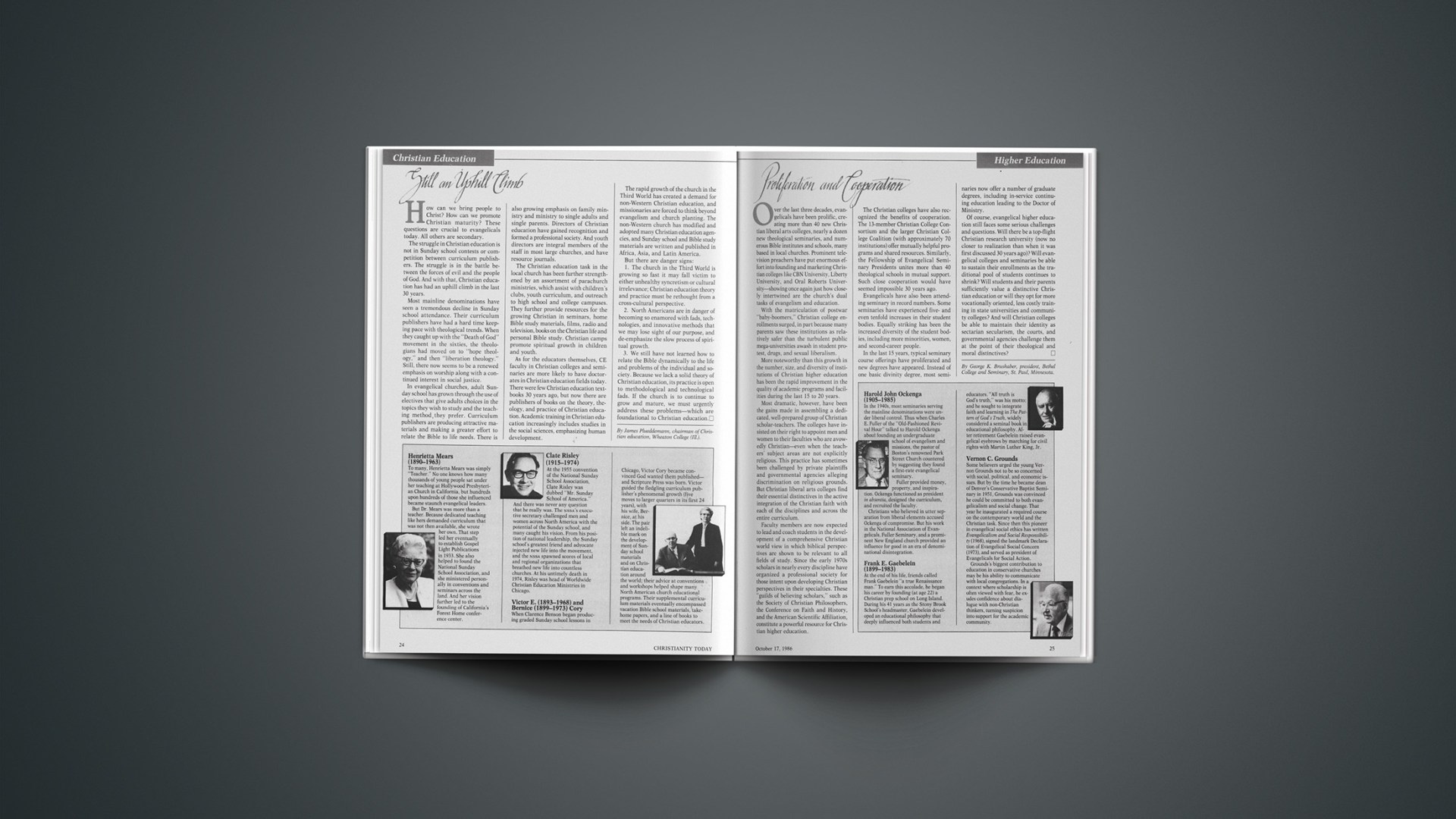How can we bring people to Christ? How can we promote Christian maturity? These questions are crucial to evangelicals today. All others are secondary.
The struggle in Christian education is not in Sunday school contests or competition between curriculum publishers. The struggle is in the battle between the forces of evil and the people of God. And with that, Christian education has had an uphill climb in the last 30 years.
Most mainline denominations have seen a tremendous decline in Sunday school attendance. Their curriculum publishers have had a hard time keeping pace with theological trends. When they caught up with the “Death of God” movement in the sixties, the theologians had moved on to “hope theology,” and then “liberation theology.” Still, there now seems to be a renewed emphasis on worship along with a continued interest in social justice.
In evangelical churches, adult Sunday school has grown through the use of electives that give adults choices in the topics they wish to study and the teaching method, they prefer. Curriculum publishers are producing attractive materials and making a greater effort to relate the Bible to life needs. There is also growing emphasis on family ministry and ministry to single adults and single parents. Directors of Christian education have gained recognition and formed a professional society. And youth directors are integral members of the staff in most large churches, and have resource journals.
The Christian education task in the local church has been further strengthened by an assortment of Parachurch ministries, which assist with children’s clubs, youth curriculum, and outreach to high school and college campuses. They further provide resources for the growing Christian in seminars, home Bible study materials, films, radio and television, books on the Christian life and personal Bible study. Christian camps promote spiritual growth in children and youth.
As for the educators themselves, CE faculty in Christian colleges and seminaries are more likely to have doctorates in Christian education fields today. There were few Christian education textbooks 30 years ago, but now there are publishers of books on the theory, theology, and practice of Christian education. Academic training in Christian education increasingly includes studies in the social sciences, emphasizing human development.
The rapid growth of the church in the Third World has created a demand for non-Western Christian education, and missionaries are forced to think beyond evangelism and church planting. The non-Western church has modified and adopted many Christian education agencies, and Sunday school and Bible study materials are written and published in Africa, Asia, and Latin America.
But there are danger signs:
1. The church in the Third World is growing so fast it may fall victim to either unhealthy syncretism or cultural irrelevance; Christian education theory and practice must be rethought from a cross-cultural perspective.
2. North Americans are in danger of becoming so enamored with fads, technologies, and innovative methods that we may lose sight of our purpose, and de-emphasize the slow process of spiritual growth.
3. We still have not learned how to relate the Bible dynamically to the life and problems of the individual and society. Because we lack a solid theory of Christian education, its practice is open to methodological and technological fads. If the church is to continue to grow and mature, we must urgently address these problems—which are foundational to Christian education.□
By James Plueddemann, chairman of Christian education, Wheaton College (Ill.).
Henrietta Mears (1890–1963)
To many, Henrietta Mears was simply “Teacher.” No one knows how many thousands of young people sat under her teaching at Hollywood Presbyterian Church in California, but hundreds upon hundreds of those she influenced became staunch evangelical leaders.
But Dr. Mears was more than a teacher. Because dedicated teaching like hers demanded curriculum that was not then available, she wrote her own. That step led her eventually to establish Gospel Light Publications in 1933. She also helped to found the National Sunday School Association, and she ministered personally in conventions and seminars across the land. And her vision further led to the founding of California’s Forest Home conference center.
Clate Risley (1915–1974)
At the 1955 convention of the National Sunday School Association, Clate Risley was dubbed “Mr. Sunday School of America.” And there was never any question that he really was. The NSSA’s executive secretary challenged men and women across North America with the potential of the Sunday school, and many caught his vision. From his position of national leadership, the Sunday school’s greatest friend and advocate injected new life into the movement, and the NSSA spawned scores of local and regional organizations that breathed new life into countless churches. At his untimely death in 1974, Risley was head of Worldwide Christian Education Ministries in Chicago.
Victor E. (1893–1968) and Bernice (1899–1973) Cory
When Clarence Benson began producing graded Sunday school lessons in Chicago, Victor Cory became convinced God wanted them published—and Scripture Press was born. Victor guided the fledgling curriculum publisher’s phenomenal growth (five moves to larger quarters in its first 24 years), with his wife, Bernice, at his side. The pair left an indelible mark on the development of Sunday school materials and on Christian education around the world; their advice at conventions and workshops helped shape many North American church educational programs. Their supplemental curriculum materials eventually encompassed vacation Bible school materials, take-home papers, and a line of books to meet the needs of Christian educators.










